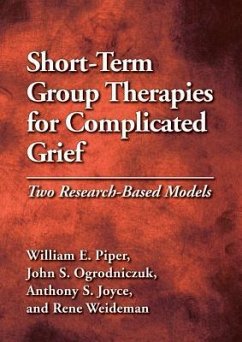William E. Piper, John S. Ogrodniczuk, Anthony S. Joyce
Short-Term Group Therapies for Complicated Grief: Two Research-Based Models
Schade – dieser Artikel ist leider ausverkauft. Sobald wir wissen, ob und wann der Artikel wieder verfügbar ist, informieren wir Sie an dieser Stelle.
William E. Piper, John S. Ogrodniczuk, Anthony S. Joyce
Short-Term Group Therapies for Complicated Grief: Two Research-Based Models
- Gebundenes Buch
- Merkliste
- Auf die Merkliste
- Bewerten Bewerten
- Teilen
- Produkt teilen
- Produkterinnerung
- Produkterinnerung
Over the past 22 years, William E. Piper and colleagues have developed and tested two models for treating complicated grief (CG) with short-term group therapy.
Andere Kunden interessierten sich auch für
![Models Of Short-Term Memory Models Of Short-Term Memory]() Susan E. Gathercole (ed.)Models Of Short-Term Memory198,99 €
Susan E. Gathercole (ed.)Models Of Short-Term Memory198,99 €![Dream Sharing and Shared Metaphors in a Short Term Community Dream Sharing and Shared Metaphors in a Short Term Community]() Alexander Randall 5thDream Sharing and Shared Metaphors in a Short Term Community21,99 €
Alexander Randall 5thDream Sharing and Shared Metaphors in a Short Term Community21,99 €![Conversations in Psychotherapy: Ways of Working with Individuals, Couples, and Families Conversations in Psychotherapy: Ways of Working with Individuals, Couples, and Families]() R. V. FitzgeraldConversations in Psychotherapy: Ways of Working with Individuals, Couples, and Families141,99 €
R. V. FitzgeraldConversations in Psychotherapy: Ways of Working with Individuals, Couples, and Families141,99 €![Traumas and Triumphs Traumas and Triumphs]() Paul FoxmanTraumas and Triumphs23,99 €
Paul FoxmanTraumas and Triumphs23,99 €![Models of Intelligence: International Perspectives Models of Intelligence: International Perspectives]() Robert J. SternbergModels of Intelligence: International Perspectives24,99 €
Robert J. SternbergModels of Intelligence: International Perspectives24,99 €![Trauma and Grief Assessment and Intervention Trauma and Grief Assessment and Intervention]() Renée Bradford GarciaTrauma and Grief Assessment and Intervention186,99 €
Renée Bradford GarciaTrauma and Grief Assessment and Intervention186,99 €![Introducing Cognitive Development Introducing Cognitive Development]() Laura TaylorIntroducing Cognitive Development64,99 €
Laura TaylorIntroducing Cognitive Development64,99 €-
-
Over the past 22 years, William E. Piper and colleagues have developed and tested two models for treating complicated grief (CG) with short-term group therapy.
Produktdetails
- Produktdetails
- Verlag: American Psychological Association (APA)
- Seitenzahl: 288
- Erscheinungstermin: August 2010
- Englisch
- Abmessung: 262mm x 189mm x 27mm
- Gewicht: 727g
- ISBN-13: 9781433808432
- ISBN-10: 1433808439
- Artikelnr.: 29604253
- Herstellerkennzeichnung
- Libri GmbH
- Europaallee 1
- 36244 Bad Hersfeld
- gpsr@libri.de
- Verlag: American Psychological Association (APA)
- Seitenzahl: 288
- Erscheinungstermin: August 2010
- Englisch
- Abmessung: 262mm x 189mm x 27mm
- Gewicht: 727g
- ISBN-13: 9781433808432
- ISBN-10: 1433808439
- Artikelnr.: 29604253
- Herstellerkennzeichnung
- Libri GmbH
- Europaallee 1
- 36244 Bad Hersfeld
- gpsr@libri.de
William E. Piper, PhD, is a professor and director of the psychotherapy program in the Department of Psychiatry, University of British Columbia, Vancouver, Canada. His primary research interests include process and outcome research for both individual and group forms of psychotherapy. He has received many research grants and published more than 180 journal articles and book chapters. He has also published five other books: Adaptation to Loss Through Short-Term Psychotherapy; Time-Limited Day Treatment for Personality Disorders; Psychological Mindedness: A Contemporary Understanding; Interpretative and Supportive Psychotherapies: Matching Therapy and Patient Personality; and Termination in Psychotherapy: A Psychodynamic Model of Progresses and Outcomes. He is past president of the Society for Psychotherapy Research and past editor of the International Journal of Group Psychotherapy. John S. Ogrodniczuk, PhD, is an associate professor and associate director of the psychotherapy program in the Department of Psychiatry, University of British Columbia, Vancouver, Canada. His psychotherapy research program examines relationships among pretherapy characteristics of patients, therapy process patterns believed to mediate change, and multivariate outcomes. His research has involved a variety of psychotherapies and patient populations, but he has a particular interest in studying psychodynamic psychotherapy, personality disorder, and men's mental health. Dr. Ogrodniczuk has held several grants to support his research and has published extensively, with nearly 100 publications to date. He is a recipient of the Outstanding Early Career Achievement Award presented by the Society for Psychotherapy Research. In addition to his research, Dr. Ogrodniczuk is involved with teaching medical students and psychiatry residents, serves as an associate editor for Psychotherapy Research, serves on the editorial board for Group Dynamics and Journal of Personality Disorders, provides regular reviews for more than a dozen scientific and clinical journals, and consults with mental health clinics about service provision and evaluation. Anthony S. Joyce, PhD, is a professor and coordinator of the Psychotherapy Research and Evaluation Unit in the Department of Psychiatry at the University of Alberta, Edmonton, Alberta, Canada. A strong believer in the scientist–practitioner model for psychologists, he is also active as an individual and group psychotherapist in the department's outpatient service. In the larger departmental context, he serves as the director of the graduate program, which offers postgraduate degrees in many areas of psychiatric research, and as a supervisor for psychiatric residents learning the practice of psychotherapy. His research interests include the relationships between patient characteristics and therapy process variables and how these relationships function as mediators, moderators, or direct predictors of positive therapy outcome. He is also interested in the development of effective treatments for patients with personality disorders. These interests encompass short- and long-term forms of individual and group psychotherapy and intensive partial hospitalization group programs. Among ongoing contributions to the psychotherapy research literature are three coauthored books, including Termination in Psychotherapy for which he served as lead author. He is a long-standing member of the Society for Psychotherapy Research and the Canadian and American Group Psychotherapy Associations. Rene Weideman, PhD, is director of the Clinical Psychology Centre in the Department of Psychology, Simon Fraser University, Burnaby, British Columbia, Canada, and associate director of faculty affairs in the psychotherapy program in the Department of Psychiatry, University of British Columbia, Vancouver, Canada. He conducts a part-time private practice in Vancouver. He previously worked for many years in the outpatient psychiatry program at Vancouver General Hospital. He has strong interests in psychotherapy training and supervision, and he has been a coauthor with Dr. Piper and colleagues of five research articles related to complicated grief.
Acknowledgments
Introduction
I. Research That Informs the Short-Term Group Therapy Models for
Complicated Group
1. Effectiveness of Individual and Group Therapies
2. Prevalence of Complicated Grief
3. Risk Factors for Complicated Grief
4. Effects of Patient Characteristics on Therapeutic Outcome
5. Effects of Process Variables on Therapeutic Outcome
6. Effects of Group Composition on Therapeutic Outcome
II. The Models: Treating Complicated Grief in Short-Term Group Therapy
1. Assessment and Preparation
2. Common Components of the Two Models
3. Time-Limited Short-Term Interpretive Group Therapy
4. Time-Limited Short-Term Supportive Group Therapy
Afterword: Future Directions
References
Index
About the Authors
Introduction
I. Research That Informs the Short-Term Group Therapy Models for
Complicated Group
1. Effectiveness of Individual and Group Therapies
2. Prevalence of Complicated Grief
3. Risk Factors for Complicated Grief
4. Effects of Patient Characteristics on Therapeutic Outcome
5. Effects of Process Variables on Therapeutic Outcome
6. Effects of Group Composition on Therapeutic Outcome
II. The Models: Treating Complicated Grief in Short-Term Group Therapy
1. Assessment and Preparation
2. Common Components of the Two Models
3. Time-Limited Short-Term Interpretive Group Therapy
4. Time-Limited Short-Term Supportive Group Therapy
Afterword: Future Directions
References
Index
About the Authors
Acknowledgments
Introduction
I. Research That Informs the Short-Term Group Therapy Models for
Complicated Group
1. Effectiveness of Individual and Group Therapies
2. Prevalence of Complicated Grief
3. Risk Factors for Complicated Grief
4. Effects of Patient Characteristics on Therapeutic Outcome
5. Effects of Process Variables on Therapeutic Outcome
6. Effects of Group Composition on Therapeutic Outcome
II. The Models: Treating Complicated Grief in Short-Term Group Therapy
1. Assessment and Preparation
2. Common Components of the Two Models
3. Time-Limited Short-Term Interpretive Group Therapy
4. Time-Limited Short-Term Supportive Group Therapy
Afterword: Future Directions
References
Index
About the Authors
Introduction
I. Research That Informs the Short-Term Group Therapy Models for
Complicated Group
1. Effectiveness of Individual and Group Therapies
2. Prevalence of Complicated Grief
3. Risk Factors for Complicated Grief
4. Effects of Patient Characteristics on Therapeutic Outcome
5. Effects of Process Variables on Therapeutic Outcome
6. Effects of Group Composition on Therapeutic Outcome
II. The Models: Treating Complicated Grief in Short-Term Group Therapy
1. Assessment and Preparation
2. Common Components of the Two Models
3. Time-Limited Short-Term Interpretive Group Therapy
4. Time-Limited Short-Term Supportive Group Therapy
Afterword: Future Directions
References
Index
About the Authors








